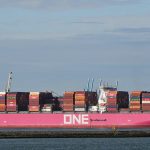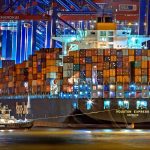Shippers Alert: Expect Delays & Fees

Shippers importing goods from anywhere in the world – but especially China and other Asian countries – should expect to experience delays and fees.
Right now, ports in Asia and the U.S. are bottlenecked with congestion, way above average cargo volume, container shortages, and a lack of available trucking.
This is a shipping crisis that has spread from Asia to the U.S.
Crisis at the Ports and Its Cause
Since COVID-19 spread from a novel coronavirus in Wuhan, China to a Pandemic causing shutdowns here in the U.S. (and in countries throughout the world), Universal Cargo has been publishing blog posts about unfair and coronavirus-related demurrage and detention fees, container shortages, trucker shortages, higher than anticipated cargo volume, pandemic-related supply chain disruptions, and it has all added up to the closest thing to a “shipageddon” that U.S. importers and exporters could expect to see.
Additionally factoring into the crisis are chassis and other equipment shortages, COVID-19 shutdowns, limited hours and crew protocols, social distancing protocols, new appointment systems at port terminals, holiday and vaccine shipping eating into the U.S. truck fleet, and less reliability from ocean freight carriers even as they’re charging record high freight rates.
Fees and Delays
Universal Cargo’s team has worked hard to shield our customers from delays and fees from carriers and port terminals that many shippers have been suffering for most of this year. At the same time, we’ve been keeping you informed on what’s happening in the international shipping industry as a whole through this blog. Unfortunately, congestion and shortages have gotten so bad at the ports and in the industry, it’s just not possible to move containers quickly enough to avoid all delays and fees, particularly demurrage fees (storage fees at the port longer than the allotted free time) that generally accumulate per diem as well as detention fees (fees for returning empty containers late) that also typically add up by the day.
Ships Backed Up at Ports
Ports in the U.S. and around the world have been suffering congestion for months. A Bloomberg News article by Brendan Murray gives a good picture of what’s happening at the ports all around the country right now as Murray focuses a short paragraph on the details of what’s happening specifically at the Ports of Los Angeles and Long Beach:
Slowly clogging up since September, the main artery for trade between China and the U.S. is still choked. Anchored off the coast of California over the weekend were almost 20 container ships waiting to offload at Los Angeles and Long Beach, up from about a dozen at the end of November. The Port of L.A. expects to handle 152,000 inbound containers this week – a 94 percent increase from the same week a year ago.
There would be one more large container ship right now with thousands more TEU (twenty-foot equivalent units) of cargo waiting with those 20 ships mentioned above if the MV ONE Apus hadn’t suffered a massive container stack collapse when a storm hit it near Hawaii as it was en route to the Port of Long Beach. Of course, shippers whose goods were onboard the Apus would probably rather see their cargo add to the port congestion than be lost at sea, despite the horrible congestion we’re seeing.
No Trucks
As horrendous as the congestion at the ports is, the impossibility of getting trucks and truckers right now is even more frustrating. Even for the most established freight forwarders like Universal Cargo with long-established relationships with truckers and trucking companies and a willingness to pay extra for the trucking can’t get truckers right now because there are no truckers to get.
Catherine Sanchez, Universal Cargo Account Manager, opened up about her frustration with problem:
You know I am going to try all resources and ways to get this done. I have tried every single trucker, including old truckers, for customers and the one that [an associate] recommended. I tried to offer extra money and nothing. I have tried to call [trucking company head whose name is omitted] and beg him…. I have been working on [trucking company B] for over a week and now all these new ones as well, and I am just totally stuck and getting very frustrated.
To be clear, this is in no way only a problem on the West Coast. Here’s a response a trucking company gave Sanchez for late December, East Coast cargo move requests, which were submitted in what would normally be plenty of time for the scheduling: “I am sorry; for the NYC/NJ area our availability is not until mid January.” There simply are no truckers available.
Demurrage, Detention, and Carriers’ Double Standard
Adding insult to injury is shippers face serious penalties for not picking up their cargo and not returning empty shipping containers on time. Shippers have long complained about the unfair nature of these demurrage and detention fees, which carriers and terminals charge by the day. Not only is the failure to move shipping containers that result in these fees completely out of shippers’ control, but there is a double standard when it comes to being on time with transportation.
Ocean freight carriers are notoriously unreliable when it comes to being on time with transporting cargo across the seas, a problem that has been much worse in 2020. Carriers implemented an onslaught of blanked (cancelled) sailings this year, pushing capacity well below demand and freight rates to record highs while causing cargo to be rolled over and over again to later sailings. Even after carriers went back to adding capacity and backing off blank sailings, they still have been failing to deliver on time at astounding rates.
Murray reported in his Bloomberg article that carriers only had their container ships on schedule about half the time last month:
Just 50.1 percent of container vessels arrived on time in November, down from 80 percent a year earlier and the lowest level in records dating to 2011, according to a service reliability index compiled by Copenhagen-based Sea-Intelligence. From Asia to North America, on-time arrivals dropped below 30 percent, less than half the long-run average globally.
Carriers aren’t paying penalties or discounting shippers when the shipping company delivers cargo late to port. In fact, carriers charged more not only with higher freight rates but with no-roll premiums, where they asked shippers to pay extra to prioritize their cargo to make it less likely to be rolled over onto later sailings than originally scheduled. This only added to the accusations shippers have been laying upon carriers of profiteering off the pandemic.
Help Me FMC Kenobi – You’re My Only Hope
Forgive the Star Wars reference, but many shippers are feeling like this is our most desperate hour and are turning to the Federal Maritime Commission (FMC) as the last hope.
Shippers’ best chance of avoiding demurrage and detention fees probably lies with action from the FMC, as it has been investigating carrier practices, especially by the major carrier alliances that dominate ocean shipping, as well as demurrage and detention fees in particular.
The FMC’s history of protecting – or perhaps I should say failure of protecting – shippers from unfair demurrage and detention fees does make shippers’ hope in the commission stepping in dwindle some. Last year, the FMC announced it would finally “address detention and demurrage charge issues” by adopting a set of recommendations by Commissioner Rebecca Dye. Actual action beyond increasing investigation following that announcement has been lacking.
In an April press conference, the FMC announced it “has issued new guidance about how it will assess the reasonableness of detention and demurrage regulations and practices of ocean carriers and marine terminal operators”:
Under the new interpretive rule, the Commission will consider the extent to which detention and demurrage charges and policies serve their primary purpose of incentivizing the movement of cargo and promoting freight fluidity. The rule also provides guidance on how the Commission may apply that principle in the context of cargo availability (and notice thereof) and empty container return.
That’s certainly a step in the direction of restricting unfair fees, but is the FMC willing to actually take action on carriers and terminals?
The FMC did just up trade data reporting requirements on carrier alliances, announced in a press release late last month. That little step of action is something but far from what the FMC is being urged to do. Bill Mongelluzzo reported in the Journal of Commerce (JOC) last month that a coalition of shippers, truckers, and customs brokers asked the FMC “to consider an immediate suspension of detention and demurrage charges at the ports of Los Angeles and Long Beach and New York-New Jersey until congestion at the country’s two largest gateways dissipates.”
FMC Has Power to Halt Unfair Demurrage and Detention Fees
I’m not a big-government guy and am of the opinion that there have been many governmental overreaches in the history of the U.S., especially this year; however, the situation shippers find themselves in right now is exactly the sort of situation for which governmental intervention is called.
The FMC does seem to be recognizing unfair practices against U.S. shippers are taking place and there is confidence from inside and outside the FMC that the commission has the power with its new interpretive rule to stop detention and demurrage fees enforced for reasons outside of shippers’ control.
Here are some excerpts from Mongelluzzo’s JOC article that highlight this:
Truckers feel confident the FMC can use its existing powers to immediately turn guidelines issued in the commission’s interpretive rulemaking decision earlier this year into rules that would require suspension of detention and demurrage charges in Los Angeles-Long Beach and New York-New Jersey.
“Using their legal powers and authority, the FMC can act quickly,” said [Harbor Trucking Association CEO Weston LaBar].
FMC commissioner Dan Maffei, in a statement to JOC.com Monday that he said reflects his personal opinion, called for the FMC to investigate reports of charging shippers and truckers for congestion-related issues they did not create.
…
“This spring, when the FMC unanimously voted to finalize the interpretive rule concerning detention and demurrage charges, I noted that we had made a first step, but should consider further action if that interpretive rule was not sufficient,” Maffei added.
[Peter Friedmann, executive director of the Agriculture Transportation Coalition] noted that issues related to congestion and demurrage are included in filings that ocean carriers have submitted to the FMC. “It’s not a question of whether they have the authority, it’s the will,” he said.
At Universal Cargo, we’ve been extraordinarily successful at protecting our customers from demurrage and detention charges, but there’s only so much we can control. Unfortunately, we have yet to see the FMC step in on these unfair fees shippers have been and are facing right now. One thing you can always rely is at Universal Cargo, no matter the challenges, we’ll always work hard and do everything possible on behalf of the shippers who entrust us with their importing and exporting needs.




